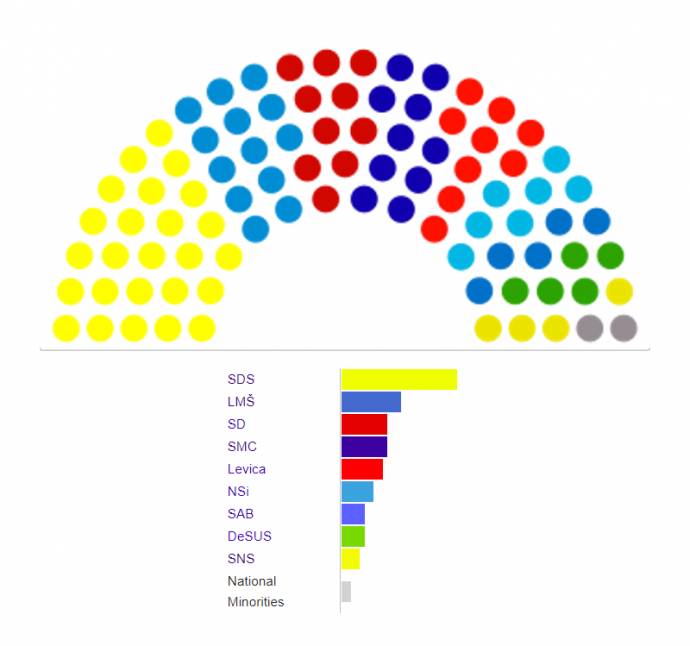The Marjan Šarec List (LMŠ) reacted with a brief response, saying that the party respected the NSi's decision to withdraw from the talks with Šarec, but it also assessed the talks so far as "constructive, considering that we have made great progress working on the coalition agreement in five days".
All our election coverage is here
After lengthy talks on Saturday, Šarec announced that the coalition agreement was largely agreed, however, the NSi decided on Monday to quit the talks with party leader Matej Tonin asserting that the party doubted the stability of such a diverse coalition of six parties.
Earlier today Tonin already met Janša for talks on a potential alternative coalition formed by the leader of the Democratic Party (SDS). President Borut Pahor expects Janša to respond by 2 PM on Thursday whether he would be willing to accept a mandate to form a government.
After talks between delegations headed by Tonin and Janša, the SDS issued a release saying that "unresolved development and structural problems of the past term call for cooperation of parliamentary parties in particular those that were not involved in government in 2014-2018".
The SDS supports the NSi's position that the two parties that won the most votes in the 3 June election held particular responsibility for government formation and that "both parties share the position on open-door policy and the need for dialogue between all parliamentary parties".
The SDS plans to send to the NSi today the substantive part of the draft coalition agreement for 2018-2022. The two parties support the proposal to amend the electoral system with a preference vote.
The Modern Centre Party (SMC) of the outgoing Prime Minister Miro Cerar, which is one of the parties involved in the Šarec-led talks, regretted the NSi's quitting the talks, but said their understanding was that the efforts to build a "coalition of five plus one party is not over yet".
"In the week that we may expect more similarly resounding messages, everyone who has gained voters' trust will definitely do a rethink about how can contribute to further stable development of our country and society," reads a written statement from the SMC.
Dejan Židan of the SocDems is still hopeful as well, saying that "anyone who negotiates and arrives at such a draft coalition agreement has a duty before the citizens to stay the course until the end".
Židan, who noted that the SocDems had agreed to a number of compromises to assuage the NSi but stood by these compromises, argued that the NSi giving up entirely could make it seem as if its first step had been made without the awareness that "it is necessary to work hard and also do something".
The SocDems head, who denied any serious conflicts with the SMC, said he had talked to Šarec today and agreed with him that the ball was now in Janša's court. The SocDems are meanwhile ready to resume talks after the first round of the PM-designate appointment procedure.
Regret about the NSi's move was also expressed by the Alenka Bratušek Party (SAB), although the party's deputy faction leader Marko Bandelli said he did not think the NSi's withdrawal was conclusive as the talks showed the six parties shared views on many points.
"I believe that such a broader coalition would be very positive and constructive. Our party is constructive, forward-looking and I think they know well themselves that this is important for the development of our country," Bandelli said, referring to the NSi.
He said that the SAB would not enter talks with Janša until the talks led by Šarec are over. Asked whether the Left should be invited to enter these talks, Bandelj said this was up to Šarec, but added: "I believe it would be right of him to invite them as well. We have nothing against it, it's positions which matter and what they agree."
Our guide to all the main parties is here
The Left, which is seen as a possible alternative to the NSi in a potential coalition formed by Šarec with the SMC, SAB, the Social Democrats and the Pensioners' Party, welcomed the NSi's decision to withdraw from the Šarec-led talks.
Asked whether the party would be willing to enter coalition talks, party coordinator Luka Mesec said they would wait for an offer, suggesting the Portuguese scenario where the Left supports a minority centrist government.
Mesec said that such a government "didn't sell a bank full of the taxpayer's cash, but negotiated a withdrawal from the commitment from the European Commission".
He said the NSi's quitting the talks was good also because "this is a party that advocates the Americanisation of healthcare, privatisation and tax cuts". The key question though is whether these are in fact the NSi's policies or something that has brought the NSi and other centrist parties together, he said.
Meanwhile, Zmago Jelničič, the leader of the National Party (SNS), the smallest parliamentary faction, said he was not surprised the NSi quit the Šarec-led talks.
NSi leader Matej Tonin is a sober and wise politician who has found out that he would not be able to contribute to rescuing the country in the company of the LMŠ, SMC, SD, DeSUS and SAB, Jelinčič said, adding that the partners were too much at odds and fighting over ministerial posts.
Citing information from circles of political advisors to French President Emmanuel Macron and German Chancellor Angela Merkel, Jeličič said the best solution for Slovenia would be a coalition between the SDS, NSi, LMŠ and his own party. He believes Šarec is "wise enough to see this is the only option".
Another snap election would be the worst-case scenario for most parties, Jelinčič said, adding that being aware of that, Janša was not rushing into coalition talks. He said he and Janša had already settled on a date to meet, but would not specify.







